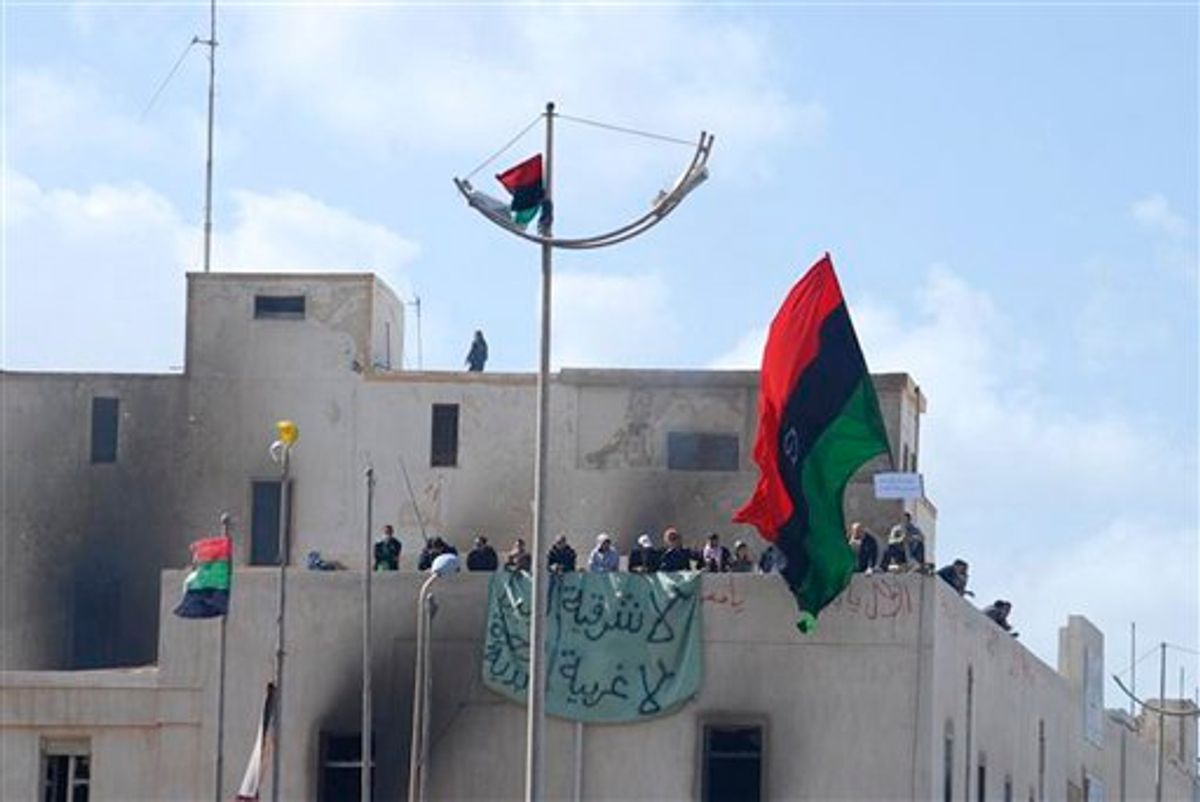-- 1969: Moammar Gadhafi, then a 27-year-old captain, leads a largely peaceful coup that overthrows the monarchy and soon becomes Libya's undisputed ruler.
-- 1970s: Gadhafi embarks on far-reaching changes in establishing a socialist system, including nationalizing businesses.
-- 1980s: Gadhafi increasingly supports groups considered terrorist in the West, including the IRA and various radical Palestinian factions. After Libya is found responsible for a bomb blast at a Berlin discotheque frequented by U.S. troops, U.S. jets bomb the country in 1986, killing Gadhafi's adopted baby daughter.
-- 1988: Suspected Libyan agents plant a bomb that blows up Pan Am Flight 103 over the Scottish town of Lockerbie, killing 270 people, mostly Americans.
-- 1999: In an early sign of trying to rehabilitate his image, Gadhafi hands over two Libyans charged in the Lockerbie bombing.
-- 2001: A Scottish court convicts one of the alleged Lockerbie bombers, Abdel Baset al-Megrahi, and sentences him to life imprisonment. The other was acquitted.
-- 2003: In steps that help the country emerge from isolation, Libya acknowledges responsibility for the Lockerbie bombing, agrees to pay up to $10 million to the relatives of each of the 270 victims, and declares it will dismantle all weapons of mass destruction.
-- 2009: Libya holds celebrations marking Gadhafi's 40 years in power. Al-Megrahi is released from a Scottish prison on compassionate grounds because he has prostate cancer. He is given a hero's welcome in Libya.
-- Feb. 16, 2011: Riot police clash with protesters in Libya's second-largest city, Benghazi. Marchers set fire to security headquarters and police stations in two other cities. Gadhafi's government seeks to allay unrest by proposing to double the salaries of government employees and releasing 110 suspected Islamic militants.
-- Feb. 17, 2011: Protesters defy a crackdown and take to the streets in five cities. At least 20 are killed in clashes with pro-government groups. First reports of Internet services being disrupted.
-- Feb. 18, 2011: Security forces clamp down on escalating protests. In Benghazi, 35 people are killed as protesters try to march on one of Gadhafi's residences.
-- Feb. 19, 2011: Pro-government forces fire on mourners leaving a funeral for protesters in Benghazi, killing at least 15 people. Special forces also attack hundreds of demonstrators, including lawyers and judges, who have camped out in front of a courthouse in the city. Authorities cut off the Internet across Libya, further isolating the country.
-- Feb. 20, 2011: Protests spread to the capital of Tripoli. At least 60 people are killed, bringing the overall death toll in five days to more than 200. Moammar Gadhafi's son, Seif al-Islam, proclaims on state television that his father remains in charge with the army's backing and will "fight until the last man, the last woman, the last bullet."
-- Feb. 21, 2011: Deep cracks open in Gadhafi's regime, with diplomats abroad and the justice minister at home resigning, air force pilots defecting and a fire raging at the main government hall after clashes in the capital Tripoli. Protesters claim control of Benghazi after some army units side with them. New York-based Human Rights Watch puts the overall death toll at 233.



Shares